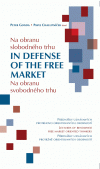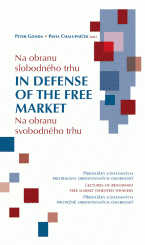 |
|||||||
| INSTITUTE | CONSERVATISM | M.R.STEFANIK |
| PUBLICATIONS
|
[03.06.2007, Peter Gonda, PUBLICATIONS]
(Milton and Rose Friedman) 1) Nowadays we can observe a phenomenon that looks like a paradox. People live longer, healthier and more prosperous lives than anytime before and at the same time they consider the principles of the free market, as explained by Adam Smith as “old-fashioned” and obsolete. They forget or they don’t want to admit that the very same traditional values referring to the market – such as property rights, unrestrained competition and nonintervention in an individual and voluntary decision-making are the key sources of today’s wealth. On the contrary, they tend to let themselves be influenced by various temptations (de facto traps) of “social privileges” and they shift the responsibility or their lives and for the decisions they are to make onto the others. Thus they exchange the unpleasant pressure of competition with the risks of the market and impact on highlighting property and other differences for more pleasant feeling of “social comfort and security”. However, an unintended consequences of this development are an increasing dependency of people on the government and undermining of the basis of the traditional ethics that creates the roots of the western civilization, including voluntary solidarity and family. Therefore nowadays we witness a wide-spread acceptance of various forms of intervention into the individual liberty, private property and competition.We are convinced that this is also consequence of misunderstanding or not accepting the fundament of the market – which is a complex of individual decisions of people that lead to a voluntary exchange of the goods between those who supply and those who demand for a certain, mutually agreed, value. To defend the free market and ideas associated with it we bring the texts of lectures by renowned classically liberal thinkers, organized by the Conservative Institute of M. R. ·tefánik in Bratislava and Liberální Institut in Prague. The lectures that were given in Slovakia are focused on the problems connected with the ambition of centralized regulation of the market as part of the processes of European integration, “welfare states” and the assumptions that make the spontaneous order of the market work towards greater freedom and prosperity. Although the citizens of Slovakia and Czech Republic got rid of the ties of the communist slavery and central planning (real socialism) more than 17 years ago, still there are other, indirect and democratic forms of social-engineering interferences in the lives of people coming from the West. The majority of these interventions are part of European integration and “creation” of the common market based on the regulated harmonization, not competition. This is another confirmation of the fact that the essence of the market (that does not need equal conditions) is not understood and it is yet another example of the journey towards political centralization in Europe. The cornerstone of the political centralization in Europe – the common currency (euro) – is evaluated by Marian L. Tupy in his article referring especially to its influence on Central and Eastern European Countries. He gives a classically liberal alternative to the centrally established and unified currency in the euro zone – a currency competition. He suggests that it would be useful to legalize euro together with the domestic currencies and possibly along with the US dollar. At the same time he hints the risks of the already started direction from monetary harmonization towards the harmonization of tax and social conditions. The problems of the tax harmonization are analysed by Daniel J. Mitchell, a specialist in the area of taxes. He reminds us of the fact that the “tax harmonization policies are designed to hinder the flow of jobs and capital from high-tax nations to low-tax nations. This is a form of cartelization – akin to an OPEC for politicians. The policies being advocated by the European Union are contrary to economic liberalization and these policies would deny people the benefits of economic growth.” Mitchell warns us that “through the tax harmonization the tax competition is weakened and the development is directed towards the high tax rates”. If the trend is kept on it can become still a greater problem for people living in countries such as Slovakia who profit economically from taxes that are lower compared to other countries. Daniel J. Mitchell leans on the work of the representatives of economic school of “public choice” that was promoted by the winner of the Nobel Prize 1986 in Economic Science, James M. Buchanan, the author of a lecture given in Prague that is also part of this book. In accordance with the message of J. M. Buchanan and other representatives of the public choice theory Mitchell says that “the tax competition serves as a valuable check on the ability of interest groups to damage an economy by creating coalitions that often through confiscatory tax burdens weaken the market’s efficiency”. Another prominent representative of the public choice theory – William A. Niskanen – introduces four alternatives of political and economic futures of Europe. He claims, for instance, that accepting the European constitution would be an important step on the journey towards deepening of the political centralization and would finally lead to creating the European state. The draft of the Treaty establishing a Constitution for Europe moreover strengthens the competence of the Union and defines the guarantee of social rights of the citizens against the state or the employers. He states that “even imperfect Europe of national states may be a better protection of liberty than approving the proposed constitution …”. Accepting it in this form would moreover deepen the causes of economical problems that subjects struggle with in Europe. The fact that problems of Western Europe are also a result of economical and political model based on a excessive “welfare state”, that inflicts damage on the majority of society,” Johnny Munkhammar states in his lectures. Using specific facts he disproves awide-spread illusion about positive impacts of the social models applied in Northern Europe, especially in Sweden, making citizens prosper. On the contrary, he uses the Swedish example to prove that distrust towards market principles and paternalistic approach to the citizens limits their creativity, productivity, creation of sources, growth of the standard of living, and it supports unethical expectations of many to gain help from the government. There is an example from the recent history of the USA presented by Ted Abram. He considers it to be a memento of the negative influence that the “welfare state” has on the motivation of people to be active and employ themselves. He also adds a conclusion derived from an experience with specifically focused programs of the employment policy that pushed people involved in the welfare systems towards greater personal responsibility. Richard W. Rahn summarizes his ideas to answer the question about the conditions that would support the free market, relatively high and long-lasting economic growth, and as many opportunities as possible. He states ten keys that any government should follow if they want the conditions in their country support this growth. From a long-term view private property, legitimate property rights and rules guaranted their protection property rights are essential for the individual liberty, functioning market and capitalism. The property rights itself is defined by Josef ·íma in his lecture as the only concept that creates the ancient basis of spontaneous order in the society – as it was elaborated by Adam Smith and later by the winner of the Nobel Prize 1974 in Economic Sience, Friedrich A. von Hayek. Josef ©íma points out that “it is the property that gives people space in which they can carry out their activities freely, without the constant need to obtain the approval of others (...). It creates a space for exchange that all the participants can benefit from.” This voluntary exchange and participation in the social distribution of labour naturally supports market relationships between people. However, in real life the governments and other central regulators intervene to the market and thus lower the effectiveness of market processes. But if the representatives of governments, European Union or others in charge doubt the market and show their distrust towards the market, it means that they actually don’t trust the people to be able to behave effectively, rationally and ethically in the process of exchange. Contrary relying on a spontaneous market order with its “invisible hand” is a natural expression of confidence in man, respecting his imperfectness (mistakes and imperfections). A necessary condition of a long-lasting sustained „spontaneous order“ in society are thus „value boundaries“ of individual liberty hat historically built in it and highly respected. Or, in words of James M. Buchanan, it is necessary to keep the “minimal ethics interdependence”, given by the “ethics of reciprocity”. In the people’s society, it requires to keep the basic abstract rules that are inevitable for respectable voluntary exchanges and other relationships between people, especially respecting life and property of others, keeping obligations (including commitments), honesty and “golden rule”. 2) Confidence in any imperfect human being and „spontaneous order with invisible hand of the market“ with accepted formal rules (no positive rights) brings, unlike any ambitions of central planners and regulators, not only individual liberty and prosperity, but also pressure on higher personal responsibility and ethics behavior. We are convinced that this book can, in its own way, contribute to the defense of the free market. Peter Gonda
Notes 1) Friedman, Milton and Rose: Free to Choose: A Personal Statement, Harcourt Brace & Company, San Diego-New York-London, 1990, p. 7. 2) Abstract formal rules are defined for instance by Friedrich A. von Hayek (see for example Hayek, Friedrich A. von: Law, Legislation and Liberty, Routledger Kegan Paul Ltd, London, 1973). |
 English | Slovak
English | Slovak
This website was created also thanks to funding granted by The Trust
for Civil Society in Central and Eastern Europe.
Website powered by Metafox CMS from Platon Group.
|
Conservative Institute of M. R. Stefanik |
Tel.:
+421 258 100 188 |

 “If we are to make that choice wisely, we must understand the fundamental… economic principles of Adam Smith, which explain how it is that a complex, organized, smoothly running system can develop and flourish without central direction, how coordination can be achieved without coercion and... we must understand why it is that attempts to replace cooperation by central direction are capable of doing so much harm.”
“If we are to make that choice wisely, we must understand the fundamental… economic principles of Adam Smith, which explain how it is that a complex, organized, smoothly running system can develop and flourish without central direction, how coordination can be achieved without coercion and... we must understand why it is that attempts to replace cooperation by central direction are capable of doing so much harm.”





